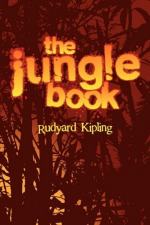Sing to your fledglings
again,
Mother,
oh lift up your head!
Evil that plagued us
is slain,
Death
in the garden lies dead.
Terror that hid in the
roses is impotent—flung on the dung-hill
and dead!
Who has delivered us,
who?
Tell
me his nest and his name.
Rikki, the valiant,
the true,
Tikki,
with eyeballs of flame,
Rikk-tikki-tikki, the
ivory-fanged, the hunter with eyeballs of
flame!
Give him the Thanks
of the Birds,
Bowing
with tail feathers spread!
Praise him with nightingale
words—
Nay,
I will praise him instead.
Hear! I will sing
you the praise of the bottle-tailed Rikki, with
eyeballs of red!
(Here Rikki-tikki interrupted,
and the rest of the song is
lost.)
Toomai of the Elephants
I will remember what
I was, I am sick of rope and chain—
I
will remember my old strength and all my forest affairs.
I will not sell my back
to man for a bundle of sugar-cane:
I
will go out to my own kind, and the wood-folk in their
lairs.
I will go out until
the day, until the morning break—
Out
to the wind’s untainted kiss, the water’s
clean caress;
I will forget my ankle-ring
and snap my picket stake.
I
will revisit my lost loves, and playmates masterless!
Kala Nag, which means Black Snake, had served the Indian Government in every way that an elephant could serve it for forty-seven years, and as he was fully twenty years old when he was caught, that makes him nearly seventy—a ripe age for an elephant. He remembered pushing, with a big leather pad on his forehead, at a gun stuck in deep mud, and that was before the Afghan War of 1842, and he had not then come to his full strength.
His mother Radha Pyari,—Radha the darling,—who had been caught in the same drive with Kala Nag, told him, before his little milk tusks had dropped out, that elephants who were afraid always got hurt. Kala Nag knew that that advice was good, for the first time that he saw a shell burst he backed, screaming, into a stand of piled rifles, and the bayonets pricked him in all his softest places. So, before he was twenty-five, he gave up being afraid, and so he was the best-loved and the best-looked-after elephant in the service of the Government of India. He had carried tents, twelve hundred pounds’ weight of tents, on the march in Upper India. He had been hoisted into a ship at the end of a steam crane and taken for days across the water, and made to carry a mortar on his back in a strange and rocky country very far from India, and had seen the Emperor Theodore lying dead in Magdala, and had come back again in the steamer entitled, so the soldiers said, to the Abyssinian War medal. He had seen his fellow elephants die of cold and epilepsy and starvation and sunstroke up at a place called Ali Musjid, ten years later; and afterward he had been sent down thousands of miles south to haul and pile big balks of teak in the timberyards at Moulmein. There he had half killed an insubordinate young elephant who was shirking his fair share of work.




